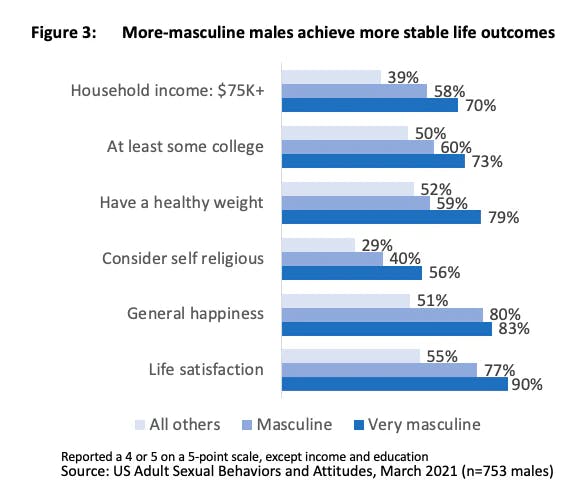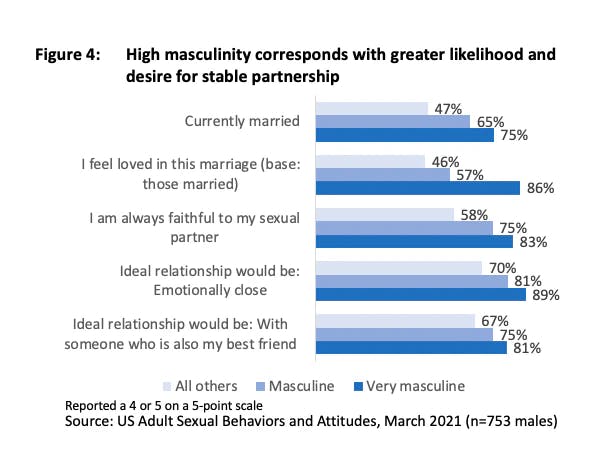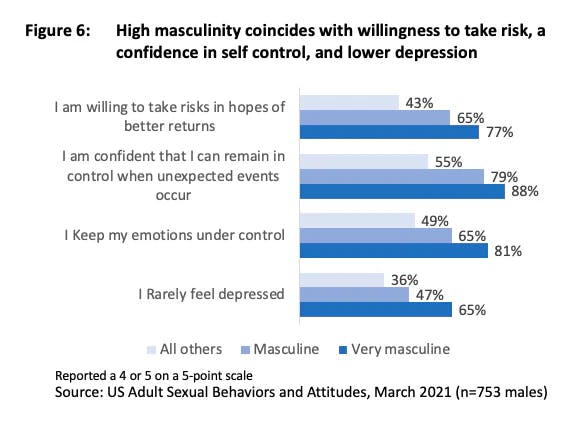Study Shows Very Masculine Men Are More Likely To Be Happy And Married
Do you think it’s possible for a man to be too masculine? Well, if you’re a believer in “toxic masculinity,” then perhaps the answer is yes.

There’s an overwhelming sentiment in the mainstream media that men should find a balance between masculinity and femininity. That for too long, men have been expected to uphold unrealistic standards of traditional masculinity that are harmful to men and society as a whole.
The media insists that if only men could learn to embrace their feminine side, the world would be a better place. But what does the data say about the correlation between masculinity and quality of life?
Study Shows That Men Are Better Off Embracing Their Masculinity
In spite of the war on masculine men, data collected in the March 2021 U.S. Adult Sexual Behaviors and Attitudes survey and interpreted by the Institute for Family Studies (IFS) explores the supposed masculinity problem and concludes that men are better off embracing their masculine nature. Men who consider themselves “masculine” or “very masculine” report “more stable and resourced life outcomes, including higher income and education, a healthier weight, greater religiosity, and increased general happiness and life satisfaction.”

But is the success of the very masculine man at the expense of women? Well, when it comes to romantic relationships, that doesn’t appear to be the case.
Increased masculinity is positively associated with romantic success. Very masculine men are more likely to be married, feel loved in their marriage, and be always faithful to their romantic partners. Very masculine men also put more effort into relationship building. They’re more likely to find joy in sacrificing for those they love, agree that love is worth fighting for, and believe that others see them as giving, loving, and affectionate.

We Need More Traditional Masculinity, Not Less
So far, masculinity sounds pretty good. So why exactly are we discouraging masculinity in men?
There’s a push for men to act more like women – physically and emotionally – and supposedly a rejection of this agenda is an indicator of misogyny or toxic masculinity. Traditional masculinity marked by strength and stoicism is suddenly a bad thing. But what if it is the qualities of strength and stoicism don’t make men bad or toxic, but rather happier and better lovers?
His Physical Strength
The attack on traditional masculinity is an attack on the very nature of men. Attributes such as aggression, competitiveness, and virility are shamed in our femininized culture, but when harnessed for good it’s precisely these qualities that allow men to pursue greatness, protect women, and rise to life’s most difficult challenges.
Women respect strong men who embrace the warrior archetype. Although most of us live comfortable lives free from primal dangers, that doesn’t negate a woman’s primitive desire for a man who can protect her against the threats of the world (one reason why women like athletes and tall men). There’s a reason that superheroes and other male protagonists are presented as strong and physically capable: women respect these men.
A man’s physical strength and competence are attractive, but that strength needs to be balanced with self-control and the wisdom to know when to use it. A man needs to know when his emotions are reaching their limit and be able to stay composed. Fortunately, the IFS study confirmed that very masculine men have those abilities.

His Emotional Strength
Physical strength paired with emotional strength is what makes a strong, masculine man.
Stoicism is a philosophy related to emotional and mental toughness. Contrary to popular belief, stoicism doesn’t mean to be unemotional. Rather, it’s a methodology for understanding emotions and handling negative situations, as well as managing judgments and expectations.
I’ve spoken to various men who have integrated stoicism into their lives, and they all speak positively of the impact it has had on their development as a man, as well as in their relationships with women.
Now, this doesn’t mean that very masculine men who practice stoicism repress their emotions, particularly in romantic relationships. According to the IFS study, very masculine men are more likely to seek emotional closeness with their partners. Perhaps this is because stoicism allows very masculine men to remain in control and approach emotional closeness in relationships from a healthy place.
Closing Thoughts
Traditional masculinity is far from being a problem. As we’ve noticed from the study, men with a strong sense of masculinity are happier, enjoy more stable life outcomes, and form healthier relationships. And when husbands are happier, healthier, and more stable, so are the wives.
The differences between the sexes are what make us whole, and we should celebrate the qualities of masculinity in men rather than attack them, just as we should celebrate the qualities of femininity in women. If it makes men happier and better lovers, then shouldn’t we all get behind that?
Readers make our world go round. Make your voice heard in the official Evie reader survey.